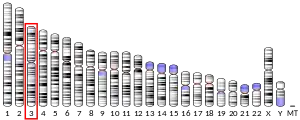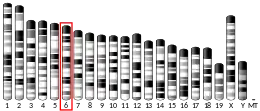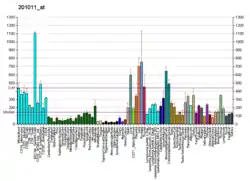RPN1
Dolichyl-diphosphooligosaccharide—protein glycosyltransferase subunit 1 is an enzyme that in humans is encoded by the RPN1 gene.[5]
This gene encodes a type I integral ribophorin membrane protein found only in the rough endoplasmic reticulum. The encoded protein is part of an N-oligosaccharyl transferase complex that links high mannose oligosaccharides to asparagine residues found in the Asn-X-Ser/Thr consensus motif of nascent polypeptide chains. This protein should not be confused with RPN1 of yeast, Drosophila, and C. elegans, which forms part of the regulatory subunit of the 26S proteasome and may mediate binding of ubiquitin-like domains to this proteasome. The human version of this proteasome subunit is PSMD2.[5]
References
- GRCh38: Ensembl release 89: ENSG00000163902 - Ensembl, May 2017
- GRCm38: Ensembl release 89: ENSMUSG00000030062 - Ensembl, May 2017
- "Human PubMed Reference:". National Center for Biotechnology Information, U.S. National Library of Medicine.
- "Mouse PubMed Reference:". National Center for Biotechnology Information, U.S. National Library of Medicine.
- "Entrez Gene: RPN1 ribophorin I".
Further reading
- Crimaudo C, Hortsch M, Gausepohl H, Meyer DI (1987). "Human ribophorins I and II: the primary structure and membrane topology of two highly conserved rough endoplasmic reticulum-specific glycoproteins". EMBO J. 6 (1): 75–82. doi:10.1002/j.1460-2075.1987.tb04721.x. PMC 553359. PMID 3034581.
- Maruyama K, Sugano S (1994). "Oligo-capping: a simple method to replace the cap structure of eukaryotic mRNAs with oligoribonucleotides". Gene. 138 (1–2): 171–4. doi:10.1016/0378-1119(94)90802-8. PMID 8125298.
- Pekarsky Y, Rynditch A, Wieser R, et al. (1997). "Activation of a novel gene in 3q21 and identification of intergenic fusion transcripts with ecotropic viral insertion site I in leukemia". Cancer Res. 57 (18): 3914–9. PMID 9307271.
- Suzuki Y, Yoshitomo-Nakagawa K, Maruyama K, et al. (1997). "Construction and characterization of a full length-enriched and a 5'-end-enriched cDNA library". Gene. 200 (1–2): 149–56. doi:10.1016/S0378-1119(97)00411-3. PMID 9373149.
- Fu J, Kreibich G (2000). "Retention of subunits of the oligosaccharyltransferase complex in the endoplasmic reticulum". J. Biol. Chem. 275 (6): 3984–90. doi:10.1074/jbc.275.6.3984. PMID 10660554.
- Dias Neto E, Correa RG, Verjovski-Almeida S, et al. (2000). "Shotgun sequencing of the human transcriptome with ORF expressed sequence tags". Proc. Natl. Acad. Sci. U.S.A. 97 (7): 3491–6. doi:10.1073/pnas.97.7.3491. PMC 16267. PMID 10737800.
- Elsasser S, Gali RR, Schwickart M, et al. (2002). "Proteasome subunit Rpn1 binds ubiquitin-like protein domains". Nat. Cell Biol. 4 (9): 725–30. doi:10.1038/ncb845. PMID 12198498. S2CID 25666734.
- Saeki Y, Sone T, Toh-e A, Yokosawa H (2002). "Identification of ubiquitin-like protein-binding subunits of the 26S proteasome". Biochem. Biophys. Res. Commun. 296 (4): 813–9. doi:10.1016/S0006-291X(02)02002-8. PMID 12200120.
- Strausberg RL, Feingold EA, Grouse LH, et al. (2003). "Generation and initial analysis of more than 15,000 full-length human and mouse cDNA sequences". Proc. Natl. Acad. Sci. U.S.A. 99 (26): 16899–903. doi:10.1073/pnas.242603899. PMC 139241. PMID 12477932.
- Basrur V, Yang F, Kushimoto T, et al. (2003). "Proteomic analysis of early melanosomes: identification of novel melanosomal proteins". J. Proteome Res. 2 (1): 69–79. doi:10.1021/pr025562r. PMID 12643545.
- Kelleher DJ, Karaoglu D, Mandon EC, Gilmore R (2003). "Oligosaccharyltransferase isoforms that contain different catalytic STT3 subunits have distinct enzymatic properties". Mol. Cell. 12 (1): 101–11. doi:10.1016/S1097-2765(03)00243-0. PMID 12887896.
- Gerhard DS, Wagner L, Feingold EA, et al. (2004). "The status, quality, and expansion of the NIH full-length cDNA project: the Mammalian Gene Collection (MGC)". Genome Res. 14 (10B): 2121–7. doi:10.1101/gr.2596504. PMC 528928. PMID 15489334.
- Shibatani T, David LL, McCormack AL, et al. (2005). "Proteomic analysis of mammalian oligosaccharyltransferase reveals multiple subcomplexes that contain Sec61, TRAP, and two potential new subunits". Biochemistry. 44 (16): 5982–92. doi:10.1021/bi047328f. PMID 15835887.
- Rual JF, Venkatesan K, Hao T, et al. (2005). "Towards a proteome-scale map of the human protein-protein interaction network". Nature. 437 (7062): 1173–8. doi:10.1038/nature04209. PMID 16189514. S2CID 4427026.
- Lim J, Hao T, Shaw C, et al. (2006). "A protein-protein interaction network for human inherited ataxias and disorders of Purkinje cell degeneration". Cell. 125 (4): 801–14. doi:10.1016/j.cell.2006.03.032. PMID 16713569. S2CID 13709685.
- Chi A, Valencia JC, Hu ZZ, et al. (2007). "Proteomic and bioinformatic characterization of the biogenesis and function of melanosomes". J. Proteome Res. 5 (11): 3135–44. doi:10.1021/pr060363j. PMID 17081065.
- Ewing RM, Chu P, Elisma F, et al. (2007). "Large-scale mapping of human protein-protein interactions by mass spectrometry". Mol. Syst. Biol. 3 (1): 89. doi:10.1038/msb4100134. PMC 1847948. PMID 17353931.
This article is issued from Wikipedia. The text is licensed under Creative Commons - Attribution - Sharealike. Additional terms may apply for the media files.





